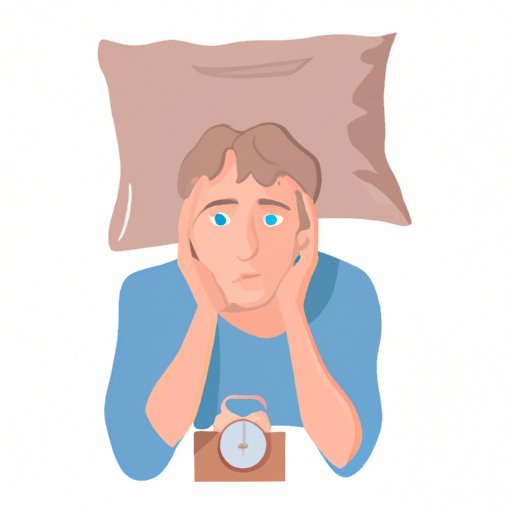
I. Introduction
Waking up in the middle of the night can be frustrating and disruptive to one’s daily life. It can affect mood, cognitive function, and overall health. This article will provide tips and techniques for sleeping through the night without waking up, allowing for a more restful and rejuvenating sleep experience.
II. Develop a Bedtime Routine
Establishing a bedtime routine can signal to the body that it is time to sleep, promoting a more consistent and restful sleep schedule. A bedtime routine can include activities such as reading, taking a warm bath, or practicing relaxation techniques.
To create a bedtime routine, set a regular bedtime and wake-up time, and aim to wind down at least an hour before bedtime. Avoid stimulating activities such as watching TV or using electronic devices, as this can interfere with the body’s natural sleep cycle. Stick to the routine, even on weekends or days off, to maintain consistency.
III. Avoiding Disruptive Substances
Caffeine and alcohol can interfere with sleep and cause nighttime awakenings. Limiting caffeine intake, especially in the afternoon and evening, can promote a more restful sleep. Alcohol may help induce sleep, but it can disrupt the natural sleep cycle and cause arousals throughout the night. Limiting liquids before bedtime can also reduce nighttime awakenings. Instead of caffeine or alcohol, consider drinking herbal tea, warm milk, or water.
IV. Creating a Comfortable Sleep Environment
The sleep environment can have a significant impact on sleep quality. Ensure the bedroom is cool, dark, and quiet, and invest in a supportive mattress and comfortable pillows. Mattresses should be replaced every 7-10 years, and pillows every 1-2 years. Consider blackout curtains or white noise machines to combat external disruptions such as loud noises or bright lights.
V. Relaxation Techniques
Relaxation techniques can help calm the mind and body before sleep, promoting a more restful night’s sleep. Techniques such as deep breathing, progressive muscle relaxation, or visualization can be practiced in bed or before bedtime. To practice deep breathing, inhale deeply through the nose and exhale slowly through the mouth, focusing on the breath. Progressive muscle relaxation involves tensing and relaxing different muscle groups, promoting relaxation and reducing tension in the body. Visualization involves imagining a peaceful scene or scenario, encouraging the mind to relax.
VI. Exercise for Better Sleep
Regular exercise can improve sleep quality and promote a more consistent sleep schedule. Aim for at least 30 minutes of moderate exercise per day, such as walking, jogging, or cycling. Exercise should be completed early in the day or at least a few hours before bedtime to avoid stimulation. For those who cannot engage in traditional exercise routines, consider low-impact activities such as yoga, tai chi, or stretching.
VII. Seeking Professional Help
When difficulty sleeping persists despite lifestyle changes, it may be time to seek help from a healthcare professional or sleep specialist. Common sleep disorders such as insomnia, sleep apnea, or restless leg syndrome can interfere with sleep quality and require treatment. Medications or therapies such as cognitive-behavioral therapy or continuous positive airway pressure (CPAP) may be recommended.
Resources for finding a provider include primary care physicians, mental health professionals, and sleep clinics. Speak to your healthcare provider for more information.
VIII. Conclusion
Sleep is essential for overall health and wellness, and waking up during the night can negatively impact daily life. By establishing a bedtime routine, avoiding disruptive substances, creating a comfortable sleep environment, practicing relaxation techniques, engaging in regular exercise, and seeking professional help when needed, sleep quality can improve. Remember to prioritize sleep and make it a priority for overall health and well-being.





